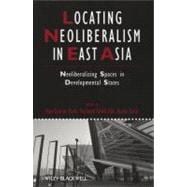
Note: Supplemental materials are not guaranteed with Rental or Used book purchases.
Purchase Benefits
What is included with this book?
Richard Child Hill is Emeritus Professor of Sociology at Michigan State University. Hill's published writings include Japanese Cities in the World Economy ( 1993), Nested Cities: The State and Urban Development in East Asia (2003), and Innovative Tokyo (2005), all co-authored with Kuniko Fujita.
Asato Saito is Visiting Lecturer in the Faculty of Social Policy and Administration at Hosei University. He is currently involved in studies comparing the governance arrangement at metropolitan and regional scale in four world cities: London, New York, Paris and Tokyo; and one investigating New Regionalism and Smart Growth in US cities.
Series Editors’ Preface x
1 Introduction: Locating Neoliberalism in East Asia 1
Richard Child Hill, Bae-Gyoon Park, and Asato Saito
2 Industry Clusters and Transnational Networks: Japan’s New Directions in Regional Policy 27
Kuniko Fujita and Richard Child Hill
3 State-Space Relations in Transition: Urban and Regional Policy in Japan 59
Asato Saito
4 Developmental Neoliberalism and Hybridity of the Urban Policy of South Korea 86
Byung-Doo Choi
5 Spatially Selective Liberalization in South Korea and Malaysia: Neoliberalization in Asian Developmental States 114
Bae-Gyoon Park and Josh Lepawsky
6 Clusters as a Policy Panacea? Critical Reflections on the Cluster Policies of South Korea 148
Yong-Sook Lee
7 Moving toward Neoliberalization? The Restructuring of the Developmental State and Spatial Planning in Taiwan 167
Chia-Huang Wang
8 Neoliberalism, the Developmental State, and Housing Policy in Taiwan 196
Yi-Ling Chen and William Derhsing Li
9 Reforming Health: Contrasting Trajectories of Neoliberal Restructuring in the City-States 225
Stephen W.K. Chiu, K.C. Ho, and Tai-lok Lui
10 “Detroit of the East”: A Multiscalar Case Study of Regional Development Policy in Thailand 257
Richard Child Hill and Kuniko Fujita
11 Concluding Remarks 294
Bae-Gyoon Park and Asato Saito
Index 303
The New copy of this book will include any supplemental materials advertised. Please check the title of the book to determine if it should include any access cards, study guides, lab manuals, CDs, etc.
The Used, Rental and eBook copies of this book are not guaranteed to include any supplemental materials. Typically, only the book itself is included. This is true even if the title states it includes any access cards, study guides, lab manuals, CDs, etc.